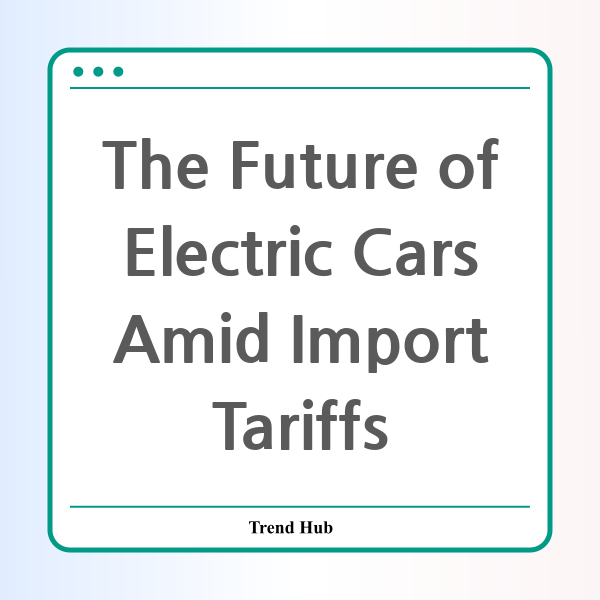* This website participates in the Amazon Affiliate Program and earns from qualifying purchases.

Are electric cars the future of transportation, or are they facing challenges that could impede their growth? With the recent proclamation regarding the adjustment of imports of automobiles and automobile parts into the United States, it’s essential to examine how these changes could influence the electric vehicle (EV) market and automotive industry as a whole.
The announcement, made by the President of the United States on March 26, 2025, underscores the growing concerns about national security tied to automobile imports. With tariffs being imposed on imported vehicles and their parts, this could significantly impact EV manufacturers, many of whom rely on imported components. Let’s delve into the implications of these changes and the evolving landscape of electric vehicles.
Understanding the Tariffs on Imports
Under the new guidelines, a 25% tariff will apply to all imports of designated automobiles and their parts effective April 3, 2025. This decision stems from a lengthy investigation that highlighted the vulnerability of domestic manufacturing and the critical nature of supply chains, especially for electric vehicles that often require specific, imported components like batteries and electronic parts.
As domestic manufacturers strive to regain a competitive edge, the impact on the EV sector could be substantial. Many electric cars currently depend on advanced technology and parts sourced from global suppliers. These tariffs might lead to increased costs for manufacturers and could ultimately be passed on to consumers. The shift in cost dynamics might either slow down the ramp-up of electric vehicles on U.S. roads or compel manufacturers to expedite domestic production.
The Challenges for Electric Vehicle Manufacturers
Electric car manufacturers have unique challenges compared to traditional automakers. While companies like Tesla have established a significant market presence, they still depend heavily on global sources for critical components. With tariffs potentially raising the costs of these imported parts, the economic feasibility of producing electric vehicles could come under scrutiny.
Furthermore, as the announcement indicates, the national security concerns are not simply about tariffs; they reflect a broader strategy to bolster the domestic manufacturing sector. American automotive companies are being encouraged to develop the capacity to produce more components locally. For instance, the EV industry needs to enhance U.S. capabilities in battery production to reduce reliance on foreign suppliers.
The Push for Domestic Manufacturing
The emphasis on increasing domestic production is not just about compliance with tariffs; it's about ensuring the long-term viability of the American automotive industry. If electric car manufacturers can establish robust local supply chains, they can mitigate the risks associated with tariffs and foreign dependency.
Moreover, investing in local factories and workforce development could create thousands of jobs, further invigorating the economy. High-tech jobs in battery production, software development, and assembly for electric vehicles could position the U.S. as a leader in EV innovation and manufacturing, creating a positive feedback loop for the industry.
Consumer Impact and Market Outlook
For consumers, the immediate effects may include an increase in the price of electric vehicles as manufacturers adjust to new costs. However, as the market adapts, it is possible that prices could stabilize, especially as competition increases and more players enter the EV space. Government incentives can also play a crucial role in maintaining demand for electric vehicles despite potential price hikes resulting from tariffs.
Looking ahead, the electric vehicle market is likely to experience volatility as it navigates these new tariffs and changing trade regulations. However, the long-term forecast remains optimistic, especially if U.S. manufacturers can innovate and establish an efficient domestic supply chain.
In summary, while the new import tariffs pose challenges for the electric vehicle industry, they also present opportunities for growth and innovation. By investing in local production and reducing dependence on foreign imports, the U.S. can create a resilient automotive industry that supports a sustainable future. As consumers, manufacturers, and policymakers adapt, the evolution of electric cars will undoubtedly shape the landscape of American transportation.
* This website participates in the Amazon Affiliate Program and earns from qualifying purchases.